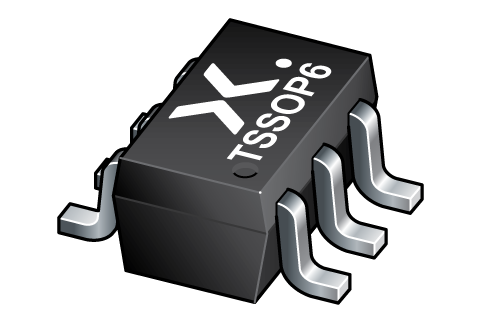可訂購部件
| 型號 | 可訂購的器件編號 | 訂購代碼(12NC) | 封裝 | 從經銷商處購買 |
|---|---|---|---|---|
| 74AUP1T45GW | 74AUP1T45GW,125 | 935280513125 | SOT363-2 | 訂單產品 |

Register once, drag and drop ECAD models into your CAD tool and speed up your design.
Click here for more informationLow-power dual supply translating transceiver; 3-state
The 74AUP1T45 is a single bit transceiver featuring two data input-outputs (A and B), a direction control input (DIR) and dual supply pins (VCC(A) and VCC(B)) which enable bidirectional level translation. Both VCC(A) and VCC(B) can be supplied at any voltage between 1.1 V and 3.6 V making the device suitable for interfacing between any of the low voltage nodes (1.2 V, 1.5 V, 1.8 V, 2.5 V and 3.3 V). Pins A and DIR are referenced to VCC(A) and pin B is referenced to VCC(B). A HIGH on DIR allows transmission from A to B and a LOW on DIR allows transmission from B to A.
Schmitt trigger action on all inputs makes the circuit tolerant of slower input rise and fall times across the entire VCC(A) and VCC(B) ranges. The device ensures low static and dynamic power consumption and is fully specified for partial power-down applications using IOFF. The IOFF circuitry disables the output, preventing any damaging backflow current through the device when it is powered down. In suspend mode when either VCC(A) or VCC(B) are at GND, both A and B are in the high-impedance OFF-state.
Wide supply voltage range:
VCC(A): 1.1 V to 3.6 V
VCC(B): 1.1 V to 3.6 V
High noise immunity
Low static power consumption; ICC = 0.9 μA (maximum)
Suspend mode
Latch-up performance exceeds 100 mA per JESD 78 Class II
Inputs accept voltages up to 3.6 V
Low noise overshoot and undershoot < 10 % of VCC
IOFF circuitry provides partial power-down mode operation
Complies with JEDEC standards:
JESD8-7 (1.2 V to 1.95 V)
JESD8-5 (1.8 V to 2.7 V)
JESD8-B (2.7 V to 3.6 V)
ESD protection:
HBM: ANSI/ESDA/JEDEC JS-001 class 3A exceeds 5000 V
CDM: ANSI/ESDA/JEDEC JS-002 class C3 exceeds 1000 V
Multiple package options
Specified from -40 °C to +85 °C and -40 °C to +125 °C
| 型號 | VCC(A) (V) | VCC(B) (V) | Logic switching levels | Output drive capability (mA) | tpd (ns) | Nr of bits | Power dissipation considerations | Tamb (°C) | Rth(j-a) (K/W) | Ψth(j-top) (K/W) | Rth(j-c) (K/W) | Package name | Category |
|---|---|---|---|---|---|---|---|---|---|---|---|---|---|
| 74AUP1T45GW | 1.1?-?3.6 | 1.1?-?3.6 | CMOS | ± 4 | 7.1 | 1 | ultra low | -40~125 | 270 | 43.3 | 158 | TSSOP6 | Bi-directional | Direction controlled |
| Model Name | 描述 |
|---|---|
|
|
| 型號 | 可訂購的器件編號,(訂購碼(12NC)) | 狀態 | 標示 | 封裝 | 外形圖 | 回流焊/波峰焊 | 包裝 |
|---|---|---|---|---|---|---|---|
| 74AUP1T45GW | 74AUP1T45GW,125 (935280513125) |
Active | p5 |

TSSOP6 (SOT363-2) |
SOT363-2 | SOT363-2_125 |
| 文件名稱 | 標題 | 類型 | 日期 |
|---|---|---|---|
| 74AUP1T45 | Low-power dual supply translating transceiver; 3-state | Data sheet | 2023-07-20 |
| AN10161 | PicoGate Logic footprints | Application note | 2002-10-29 |
| AN90063 | Questions about package outline drawings | Application note | 2025-06-13 |
| Nexperia_document_guide_Logic_translators | Nexperia Logic Translators | Brochure | 2021-04-12 |
| SOT363-2 | 3D model for products with SOT363-2 package | Design support | 2023-02-02 |
| aup1t45 | aup1t45 IBIS model | IBIS model | 2014-12-21 |
| Nexperia_document_leaflet_Logic_AUP_technology_portfolio_201904 | Nexperia_document_leaflet_Logic_AUP_technology_portfolio_201904 | Leaflet | 2019-04-12 |
| SOT363-2 | plastic thin shrink small outline package; 6 leads; body width 1.25 mm | Package information | 2022-11-21 |
| SOT363-2_125 | TSSOP6 ; Reel pack for SMD, 7"; Q3/T4 product orientation | Packing information | 2022-11-04 |
| 74AUP1T45GW_Nexperia_Product_Reliability | 74AUP1T45GW Nexperia Product Reliability | Quality document | 2025-03-20 |
The Nexperia Longevity Program is aimed to provide our customers information from time to time about the expected time that our products can be ordered. The NLP is reviewed and updated regularly by our Executive Management Team. View our longevity program here.
| Model Name | 描述 |
|---|---|
|
|
| 型號 | Orderable part number | Ordering code (12NC) | 狀態 | 包裝 | Packing Quantity | 在線購買 |
|---|---|---|---|---|---|---|
| 74AUP1T45GW | 74AUP1T45GW,125 | 935280513125 | Active | SOT363-2_125 | 3,000 |
|
作為 Nexperia 的客戶,您可以通過我們的銷售機構訂購樣品。
如果您沒有 Nexperia 的直接賬戶,我們的全球和地區分銷商網絡可為您提供 Nexperia 樣品支持。查看官方經銷商列表。
The interactive datasheets are based on the Nexperia MOSFET precision electrothermal models. With our interactive datasheets you can simply specify your own conditions interactively. Start by changing the values of the conditions. You can do this by using the sliders in the condition fields. By dragging the sliders you will see how the MOSFET will perform at the new conditions set.